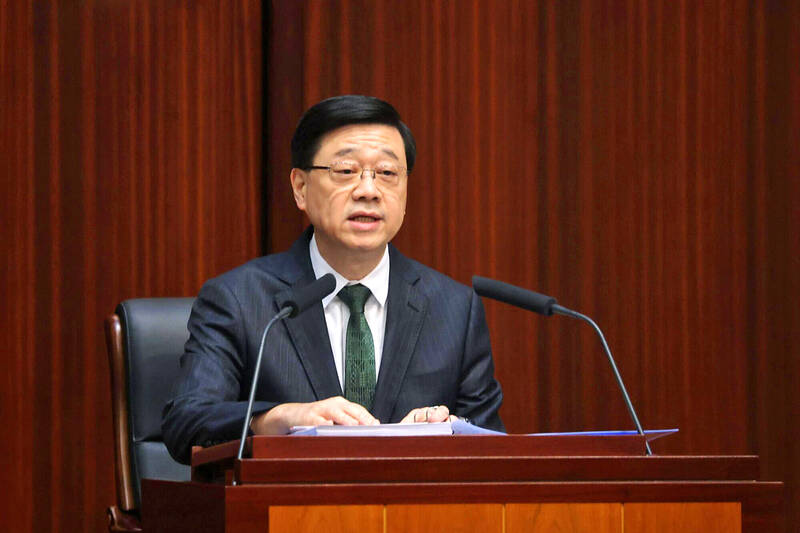Hong Kong is to loosen mortgage rules and cut an alcohol tax in a series of measures seeking to support the flagging real-estate sector and boost spending, as China’s slowdown weighs on the territory’s economy.
Hong Kong Chief Executive John Lee (李家超) yesterday said he would raise the amount of loans homebuyers are allowed to borrow for some properties and broaden a residency-by-investment program.
The territory’s leader also announced a drastic cut to a tax on liquor, looking to boost a services sector struggling with fewer tourists and weak sentiment.

Photo: Bloomberg
“We must maintain our development momentum and self-renewal, and that we must embrace changes while staying principled, innovative and flexible in meeting challenges and opportunities,” Lee said in his annual policy address.
Lee set his sights on boosting the economy after cementing Beijing’s authority over the territory with a new national security law earlier this year, a move Western governments criticized for muzzling open discussion in the Asian finance hub.
The territory’s economy grew in the first six months within the official forecast range of 2.5 to 3.5 percent, thanks to strong exports that offset sluggish consumption, although China’s slowdown and geopolitical uncertainties have cast a cloud on Hong Kong’s growth outlook.
A focus of Lee’s speech was the ailing property sector, with home prices hovering near a 2016 low.
He said the maximum loan-to-value ratio for all homes would be set at 70 percent, allowing some homebuyers to fork out lower down payments.
The ratio is currently capped below that threshold for homes above HK$30 million (US$3.86 million) and 60 percent for those valued above HK$35 million.
A broadened investment migration program would include homes valued at HK$50 million or more as part of the required HK$30 million investment. Previously excluded, such property purchases would fulfill one-third of that requirement.
Thomas Chak (翟聰), head of capital markets and investment services at Colliers International, said the new home investment policy would help attract wealthy individuals to the territory and boost transaction volume in luxury properties, but would have a limited impact on the general residential market.
Hong Kong would also lower the amount of tax it levies on spirits to help the services and food industry, Lee said.
The duty for liquor with an import price of more than HK$200 would be lowered to 10 percent from 100 percent, with the lower rate applicable to the excess amount.
These sectors have struggled as sales and tourist arrivals remain below levels before the COVID-19 pandemic, with a wave of bankruptcies pointing to eroding business finances. That period saw the territory’s image take a hit from draconian quarantine measures and a crackdown on pro-democracy political opposition, including former media mogul Jimmy Lai (黎智英), whose national security trial resumes next month.

SEEKING CLARITY: Washington should not adopt measures that create uncertainties for ‘existing semiconductor investments,’ TSMC said referring to its US$165 billion in the US Taiwan Semiconductor Manufacturing Co (TSMC, 台積電) told the US that any future tariffs on Taiwanese semiconductors could reduce demand for chips and derail its pledge to increase its investment in Arizona. “New import restrictions could jeopardize current US leadership in the competitive technology industry and create uncertainties for many committed semiconductor capital projects in the US, including TSMC Arizona’s significant investment plan in Phoenix,” the chipmaker wrote in a letter to the US Department of Commerce. TSMC issued the warning in response to a solicitation for comments by the department on a possible tariff on semiconductor imports by US President Donald Trump’s

‘FAILED EXPORT CONTROLS’: Jensen Huang said that Washington should maximize the speed of AI diffusion, because not doing so would give competitors an advantage Nvidia Corp cofounder and chief executive officer Jensen Huang (黃仁勳) yesterday criticized the US government’s restrictions on exports of artificial intelligence (AI) chips to China, saying that the policy was a failure and would only spur China to accelerate AI development. The export controls gave China the spirit, motivation and government support to accelerate AI development, Huang told reporters at the Computex trade show in Taipei. The competition in China is already intense, given its strong software capabilities, extensive technology ecosystems and work efficiency, he said. “All in all, the export controls were a failure. The facts would suggest it,” he said. “The US

The government has launched a three-pronged strategy to attract local and international talent, aiming to position Taiwan as a new global hub following Nvidia Corp’s announcement that it has chosen Taipei as the site of its Taiwan headquarters. Nvidia cofounder and CEO Jensen Huang (黃仁勳) on Monday last week announced during his keynote speech at the Computex trade show in Taipei that the Nvidia Constellation, the company’s planned Taiwan headquarters, would be located in the Beitou-Shilin Technology Park (北投士林科技園區) in Taipei. Huang’s decision to establish a base in Taiwan is “primarily due to Taiwan’s talent pool and its strength in the semiconductor

French President Emmanuel Macron has expressed gratitude to Hon Hai Precision Industry Co (鴻海精密) for its plan to invest approximately 250 million euros (US$278 million) in a joint venture in France focused on the semiconductor and space industries. On his official X account on Tuesday, Macron thanked Hon Hai, also known globally as Foxconn Technology Group (富士康科技集團), for its investment projects announced at Choose France, a flagship economic summit held on Monday to attract foreign investment. In the post, Macron included a GIF displaying the national flag of the Republic of China (Taiwan), as he did for other foreign investors, including China-based